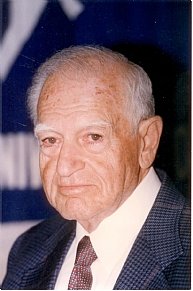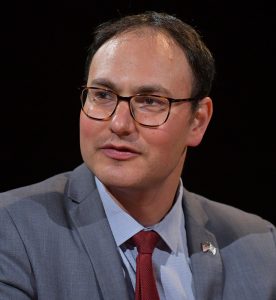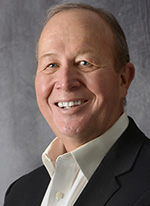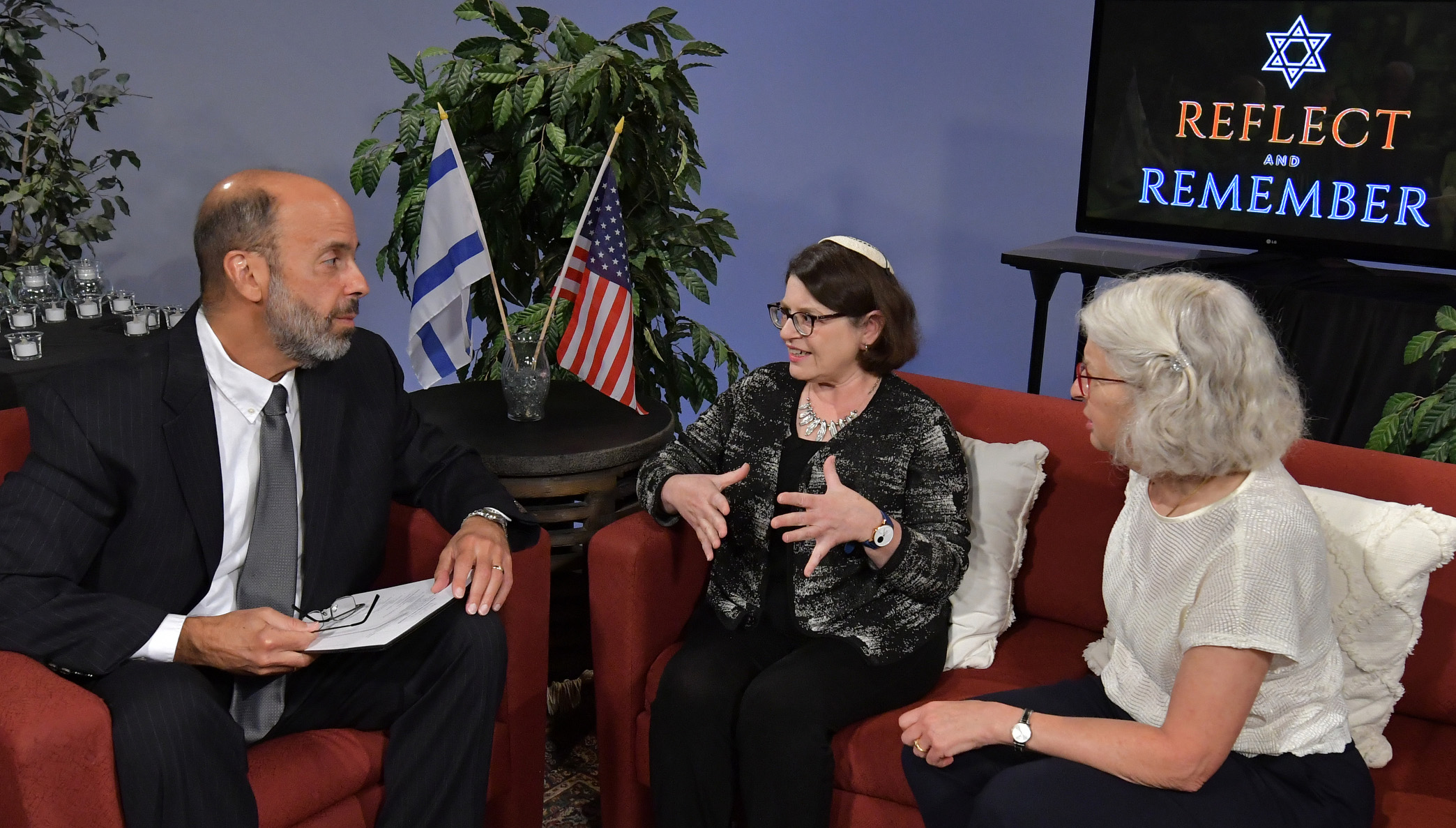Sam Rothberg helped us remember the Holocaust in Peoria, where the relationship with Israel remains strong.

It all started with “Sam of Peoria.”
Indeed, the connective tissue that to this day helps bind Peoria with the Jewish state of Israel was largely born of the efforts of Samuel Rothberg, a son of Ukraine who came to Peoria for work and never left, making it his home. But while his feet were firmly planted in the fertile fields of central Illinois, a big piece of his heart was beating in a desert nation more than 6,000 miles away.
In 1947, Rothberg was a successful business executive in the U.S., at American Distilling Co. here in the Peoria area. A trip overseas put him in the company of the orphans of the Holocaust, the children with no families left, stranded in camps, awaiting their fates.
“I just could not stop the tears,” he would later recall. “I decided then and there, I was going to do everything that I could to see that this never happens to my children.”
That silent vow turned into solid action as Rothberg co-founded the State of Israel Bonds program, which would raise billions for the development of the Jewish state. He would chair the international board of Hebrew University in Jerusalem — the International School there bears his name — as he would serve on the board of Bradley University in Peoria. His generosity also made multiple institutions devoted to the pursuit of peace and medical research possible in Israel. He helped plant the seeds that sprouted into Israel’s status today as a high-tech powerhouse, the Mideast’s Silicon Valley. From David Ben-Gurion through Golda Meir and beyond, he was on a first-name basis with Israel’s prime ministers.
Israeli diplomats are regular visitors to the Peoria area today in part because of that history. Peoria has a thriving Jewish Federation today in part because of Rothberg’s example. The children and grandchildren of Holocaust survivors came together at WTVP Studio in Peoria recently, their sometimes-tearful testimonials embodying the “never again” spirit of Sam Rothberg.
Seven with ties to central Illinois — Alan Gordon, Stella Griminger, Sheldon Katz, Julie Luner, Rabbi Bryna Milko, Alan Ross and Annette Small — shared their emotional, personal stories as second- and third-generation survivors at WTVP studios this past September, in collaboration with the Jewish Federation of Peoria. The 90-minute program that emerged from the event, “Reflect and Remember,” will air at 5:30 p.m Sunday, Jan. 29 on WTVP Channel 47, coinciding with the commemoration of this month’s International Holocaust Remembrance Day.
Theirs was a common refrain: Succeeding generations were largely spared the details of the horrors experienced on the battlefield and in Nazi concentration camps such as Auschwitz, which has created something of a conundrum as the world has turned the corner into the 21st century and an era of rising anti-Semitism and Holocaust denial.

“To make (the Holocaust) significant, we have to deal with the personal aspects of history. If we let this stay as something that ‘was,” we will never learn,” said Daniel Aschheim, Ph.D., deputy consul general at Israel’s Midwest Consulate in Chicago, who was in Peoria to participate in that event and share his own story.
In fact, he was not familiar with his own family’s Holocaust history until about six years ago, when his wife mentioned it while they were out to dinner one night. In his ensuing research, Aschheim discovered that 22 of his ancestors were among the estimated 6 million Jews who perished during the Nazi’s reign — in Czechoslovakia and Poland, in the forests and in the death camps. “This was a shocking moment to me,” he said.
Again, many survivors just wanted to bury the memories of one of the most monstrous episodes in human history and move on with their lives. Like the World War II veterans who ultimately freed them, there are a fewer and fewer still with us, so there is a danger that their stories will be lost, relegated to dusty history books, easy to overlook or be dismissed by modern generations. It falls on their descendants to spread the word, or risk a repeat as ignorance and hatred flourish in the vacuum of silence.
As Stella Griminger, whose father Jack Tevah was the only member of his immediate family to survive, noted: “Just like we do not want to forget the Twin Towers” of 9/11, “you do not want to forget the Holocaust. It’s important.”
A strong Israel, an Israel that exists as “a lighthouse of morality,” is also necessary to ensure that “that this will never happen again, not to Jews, and not to anybody else,” said Aschheim. “This will only be done when we understand what hatred, what antisemitism, what bigotry does to normal human beings.”
While there are discouraging trends — when people say “some of my best friends are Jewish but I think the state of Israel shouldn’t exist, that is crossing the line” — there are reasons for optimism, too, said Aschheim, who participated in multiple interviews over the course of his visit.
Israel is now two years out from the Abraham Accords, which has more of Israel’s neighbors, once hostile, “joining the circle of peace,” said Aschheim. Borders are open and direct flights now available where they weren’t before. The agreement has been a “game changer.”
That’s not to say that conflicts and concerns don’t remain. The Iranian regime and its nuclear ambitions, for example, are an issue for Israel and arguably for the rest of the world, said Aschheim. On that score and others, the relationship between America, with 5.5 million Jews, and Israel, with a population of 9 million, remains as important as ever, underpinned by their shared democratic ideals, which transcend the political personalities and disputes of any given moment.
“Every Israeli knows when you are born that America and Israel are the closest allies in the world,” said Aschheim.
Meanwhile, there is potential for that cooperation to grow, specifically on the economic front. Aschheim noted potential partnership opportunities in central Illinois, specifically in the biotech and emerging automotive technology arenas. It’s “a natural connection,” he said.
“People here are the asset. People in Israel are the asset,” said Aschheim. It’s not just natural resources “it’s the human resource.”
All in all, he believes that Rothberg “would be very proud” of the relationship the Peoria area continues to cultivate with the Jewish state, where his importance cannot be understated, according to no less an authority than Ben-Gurion, Israel’s primary founder and first prime minister. “I can think of few people in the United States who have individually contributed so much — both in resources and dogged day-to-day effort,” he said of Rothberg.
As often as he went to Israel, Rothberg always came back home to Peoria. He died here in 2007, at age 96. An editorial in the Jerusalem Post would memorialize a “giant of a man” and proclaim that “there is not an inch of Israel that has not been touched by Sam Rothberg… Israel has lost a founding father… an inimitable and indomitable leader…
“There was none like Sam.”





